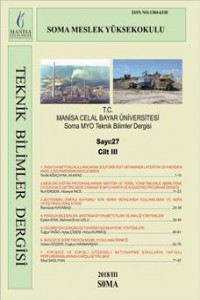Abstract
Mobile learning; provides students with the
flexibility in time and place, easy access to knowledge. As in all areas of
education, mobile technologies are widely used in teaching of foreign language.
In this paper, the Learning Training Set - English (LETS English) mobile
learning application developed to support as a complementary tool in teaching
English for Foreign Language and Vocational Foreign Language courses in
Vocational Schools. The mobile application was designed to be installed into
mobile devices with Android operating system. The application has been planned
and implemented in accordance with the selected topics from the foreign
language teaching subjects. Our mobile application consists of three modules:
Topics, Examples and Training. The training module covers different types of
testing like single answer questions, multiple answer questions and word order.
The feedback from the students, promotes positive attidues for the use of the
application towards learning English as a foreign language.
References
- Ağca, R. K., Özdemir, S., (2013). Foreign language vocabulary learning with mobile technologies. Procedia-Social and Behavioral Sciences, 83: 781-785.
- Andersen, I., (2013). Mobile Apps for Learning English. A Review of 7 Complete English Course Apps: Characteristics, Similarities and Differences, Lisans Tezi, Sigillum Universitatis Islandiae.
- Çavuş, N., İbrahim, D. (2009). m-Learning: an experiment in using SMS to support learning new English language words. British Journal of Educational Technology, 40(1):78-91
- Hayati, A., Jalilifar, A., Mashhadi, A., (2013). Using Short Message Service (SMS) to teach English idioms to EFL students. British Journal of Educational Technology, 44(1):66-81.
- Hsu, L., (2013), English as a foreign language learners’ perception of mobile assisted language learning: a cross-national study, Journal Computer Assisted Language Learning, Volume 26(3):1-17.
- Kukulska-Hulme, A., Shield, L., (2008). An overview of mobile assisted language learning: From content delivery to supported collaboration and interaction, ReCALL. 20(3): 271-289.
- Lu, M., (2008). Effectiveness of vocabulary learning via mobile phone. Journal of Computer Assisted Learning, 24: 515-525.
- O’Malley, C., Vavoula, G., Glew, JP., Taylor, J., Sharples, M., Lefrere, P., (2003). MOBIlearn WP4: guidelines for learning/teaching/tutoring in a mobile environment.
- Teodorescu, A., (2015). Mobile learning and its impact on business English learning. Procedia-Social and Behavioral Sciences, 180: 1535-1540.
- Thornton, P., Houser, C., (2005). Using mobile phones in English education in Japan. Journal of Computer Assisted Learning 21: 217–228.
- Wu, Q., (2015). Designing a smartphone app to teach English (L2) vocabulary. Computers & Education, 85:170-179.
- Zhang, M., Trusell, R., Gellegos, B., Asam, R., (2015). Using Math Apps for Improving Student Learning: An Exploratory Study in an Inclusive Fourth Grade Classroom. TechTrends, 59:32-39.
Abstract
Mobil öğrenme; öğrenciye zaman ve yer
konusunda esneklik sağlayarak, bilgiye erişiminde kolaylıklar sağlar. Eğitimin
her alanında olduğu gibi Yabancı Dil eğitimi alanında da mobil teknolojiler
yaygın olarak kullanılmaktadır. Bu çalışmada geliştirilen Learning Training Set
– English (LETS English) mobil uygulaması Meslek Yüksekokullarında eğitim
planında yer alan Yabancı Dil ve Mesleki Yabancı Dil dersleri için yardımcı bir
öğretim aracı olarak tasarlanmıştır. Uygulama, Android işletim sistemi kullanan
mobil cihazlar için geliştirilmiştir. Mobil uygulama yazılımı, yabancı dil
öğretiminde yer alan konulardan seçilerek hazırlanmıştır. Uygulama, konuların
anlatımı, örnek açıklamalar ve testler olmak üzere üç ana modülden
oluşmaktadır. Test uygulama modülü öğrenciler için farklı soru türlerini
kapsayacak şekilde tasarlanmıştır. Öğrencilerden alınan geri bildirimler, mobil uygulama yazılımının
yabancı dil öğrenme sürecine olumlu yönde katkı sağlayabileceğini
göstermektedir.
References
- Ağca, R. K., Özdemir, S., (2013). Foreign language vocabulary learning with mobile technologies. Procedia-Social and Behavioral Sciences, 83: 781-785.
- Andersen, I., (2013). Mobile Apps for Learning English. A Review of 7 Complete English Course Apps: Characteristics, Similarities and Differences, Lisans Tezi, Sigillum Universitatis Islandiae.
- Çavuş, N., İbrahim, D. (2009). m-Learning: an experiment in using SMS to support learning new English language words. British Journal of Educational Technology, 40(1):78-91
- Hayati, A., Jalilifar, A., Mashhadi, A., (2013). Using Short Message Service (SMS) to teach English idioms to EFL students. British Journal of Educational Technology, 44(1):66-81.
- Hsu, L., (2013), English as a foreign language learners’ perception of mobile assisted language learning: a cross-national study, Journal Computer Assisted Language Learning, Volume 26(3):1-17.
- Kukulska-Hulme, A., Shield, L., (2008). An overview of mobile assisted language learning: From content delivery to supported collaboration and interaction, ReCALL. 20(3): 271-289.
- Lu, M., (2008). Effectiveness of vocabulary learning via mobile phone. Journal of Computer Assisted Learning, 24: 515-525.
- O’Malley, C., Vavoula, G., Glew, JP., Taylor, J., Sharples, M., Lefrere, P., (2003). MOBIlearn WP4: guidelines for learning/teaching/tutoring in a mobile environment.
- Teodorescu, A., (2015). Mobile learning and its impact on business English learning. Procedia-Social and Behavioral Sciences, 180: 1535-1540.
- Thornton, P., Houser, C., (2005). Using mobile phones in English education in Japan. Journal of Computer Assisted Learning 21: 217–228.
- Wu, Q., (2015). Designing a smartphone app to teach English (L2) vocabulary. Computers & Education, 85:170-179.
- Zhang, M., Trusell, R., Gellegos, B., Asam, R., (2015). Using Math Apps for Improving Student Learning: An Exploratory Study in an Inclusive Fourth Grade Classroom. TechTrends, 59:32-39.
Details
| Primary Language | Turkish |
|---|---|
| Journal Section | 27. Sayı Cilt III |
| Authors | |
| Publication Date | December 24, 2018 |
| Submission Date | November 5, 2018 |
| Published in Issue | Year 2018 Volume: 3 Issue: 27 |

